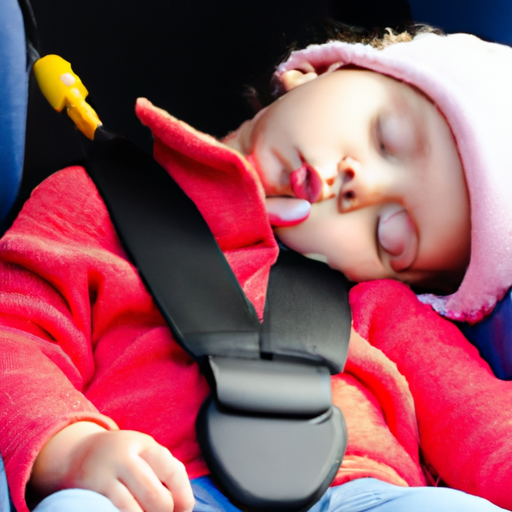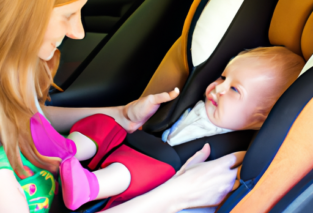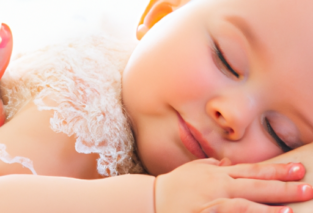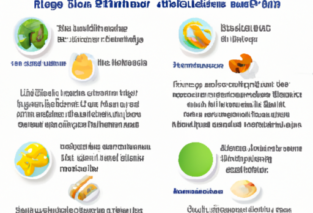Imagine this: you pop your little one into their car seat, start up the engine, and within minutes, they’re peacefully snoozing away. It’s a familiar scenario for many parents, leaving them pondering the question: why do babies fall asleep in the car? From the gentle vibrations to the white noise of the engine, there are fascinating reasons behind this phenomenon that we’ll explore in this article. So buckle up, and let’s dive into the world of car-induced slumber for our littlest travelers.
Soothing Motion
Gentle rocking motion
Babies are naturally soothed by gentle rocking motions, which mimic the movements they experienced in the womb. The rhythmic swaying of a car can create a sense of comfort and security for babies, making it easier for them to fall asleep. The repetitive motion helps relax their muscles and calm their nervous system, leading to a state of drowsiness.
Equalized pressure on the ears
Another reason babies fall asleep in the car is the equalized pressure on their ears. The changes in altitude during car rides, such as going up and down hills or over bumps, can help regulate the pressure in their ears. This is especially beneficial when babies are experiencing discomfort or pain from ear infections or teething. The relief in pressure can alleviate their discomfort, making it easier for them to drift off to sleep.
White noise effect
The steady hum of the car engine provides a consistent and predictable sound that acts as white noise for babies. Similar to the calming effect of gentle rocking, white noise helps babies relax and fall asleep. It drowns out other noises and distractions, creating a soothing environment that promotes sleep. The constant background noise can also help mask sudden sounds that might startle a sleeping baby, allowing them to stay asleep for longer periods.
Comfortable Environment
Temperature control
A comfortable temperature is essential for promoting sleep, and the car provides an environment where temperature can be easily regulated. Parents can adjust the heating or cooling system to ensure the car remains at a suitable temperature for their baby. Being neither too hot nor too cold creates a comfortable atmosphere that promotes relaxation and sleep.
Cozy car seat
Car seats are designed to provide support and comfort for infants, making them an ideal sleeping spot. The cushioning and plush materials of a car seat create a cozy and snug environment, cradling the baby as they snooze. The snug fit of the seat can also recreate the feeling of being held or swaddled, which is known to calm babies and help them fall asleep.
Dimmed lighting
The dimmed lighting inside a car can contribute to creating a sleep-friendly environment for babies. The reduced brightness provides a cue for their bodies to wind down and prepare for rest. The absence of harsh, bright lights helps regulate their melatonin levels, the hormone responsible for regulating sleep. The combination of low lighting, a comfortable car seat, and soothing motion creates a tranquil atmosphere that encourages sleep.

Familiarity
Scent of the car
Babies have a keen sense of smell, and familiar scents can play a significant role in soothing them to sleep. The baby becomes accustomed to the unique smell of the car and associates it with comfort and security. Whether it’s the smell of leather seats, car air fresheners, or a hint of their parents’ personal scents, the familiar aroma triggers a sense of familiarity and relaxation, making it easier for them to drift off to sleep.
Visual stimuli
The sights and visuals associated with car rides can also contribute to babies falling asleep. The passing scenery, the gentle swaying of the car, and the monotony of the road can have a hypnotic effect on babies. The repetitive movement and lack of visual stimulation outside the car window can lull the baby into a state of tranquility, making sleep more likely.
Routine
Most parents establish a routine around naptime or bedtime, and car rides can become a regular part of that sleep routine. Babies thrive on familiarity and predictability, so when they consistently fall asleep in the car as part of their sleep routine, it becomes a cue for their bodies to prepare for sleep. The familiarity of the routine can create a sense of comfort and ease, facilitating the transition from wakefulness to sleep.
Sensory Stimulation
Visual stimulation
Although the car environment may seem visually monotonous to adults, babies can find the constant movement and changing scenery stimulating. Visual stimulation can help distract babies from any discomfort or restlessness they may be feeling and redirect their attention to the world around them. This distraction can create a calm and soothing effect, helping babies fall asleep.
Auditory stimulation
In addition to the white noise effect, babies may find certain sounds associated with car rides comforting. The sound of tires rolling on the road, the rhythmic patter of raindrops on the car roof, or even the voices of their parents conversing can all contribute to a soothing auditory environment. These familiar sounds, coupled with the rhythmic motion of the car, can create a sensory experience that promotes relaxation and induces sleep.

Reduces Anxiety
Sense of security
The car provides a cocoon-like environment that can help reduce anxiety for babies. The familiar surroundings, the tactile comfort of the car seat, and the presence of their parents create a sense of security and reassurance. This feeling of safety can significantly reduce any anxiety or stress a baby may be experiencing, making it easier for them to fall asleep and stay asleep for longer periods.
Distraction from separation anxiety
Many babies experience separation anxiety when they are away from their parents or caregivers. Being in the car and in close proximity to their parents can help distract babies from this separation anxiety. The physical presence and interaction with their loved ones create a sense of comfort and connection, easing any anxiety they may be feeling and promoting sleep.
Calming effect on the mind
The combination of the soothing motion, white noise, and cozy environment in the car can all have a calming effect on a baby’s mind. The repetitive movements, predictable sounds, and familiar surroundings stimulate the relaxation response in the brain. This helps quiet the mind, reduce stress, and prepare the baby for sleep.
Travel Fatigue
Physical exhaustion
The physical exertion of being in a moving car can tire out babies, leading to sleepiness. The body’s constant adjustments to the car’s movements, such as bracing against corners or absorbing bumps, can be physically taxing for a baby. This physical fatigue, combined with the other sleep-inducing factors of the car environment, can make falling asleep almost inevitable.
Monotonous environment
While adults may find long car rides monotonous, babies can find the repetitive nature of the car environment soothing. The absence of sudden or drastic changes in their surroundings creates a predictable and stable environment that supports sleep. The lack of visual excitement or overstimulation can help babies focus on winding down and falling asleep.
Limited movement
The confined space of a car seat restricts a baby’s movement, making it more difficult for them to stay awake and play. Babies are more likely to fall asleep in situations where their options for physical activity are limited. The restricted movement in the car seat can contribute to their physical fatigue and promote sleep.

Association with Sleep
Previous successful sleep experiences
If a baby has had previous successful sleep experiences in the car, they are more likely to associate it with sleep. Babies quickly learn and adapt to their environment, and their experiences shape their behaviors and sleep patterns. If a baby has consistently fallen asleep in the car before, they are more likely to repeat that behavior as they recognize the cues and conditions that promote sleep.
Conditioned response
The repetition of falling asleep in the car can create a conditioned response in babies. Just like Pavlov’s dogs salivating at the sound of a bell, babies can become conditioned to associate the car with sleep. When they enter the car, their bodies and minds anticipate sleep, making it easier for them to fall asleep and follow their established sleep routine.
Transitional Sleep
Lulling effect of the car motion
The gentle rocking and swaying motion of the car can have a lulling effect on babies, making it easier for them to transition from wakefulness to sleep. The rhythmic movement mimics the sensations they experienced in the womb, creating a sense of familiarity and comfort. This soothing motion can help babies relax their bodies and drift off into a peaceful sleep.
Ease in transitioning from wakefulness to sleep
The car provides a transitionary space that allows babies to gradually shift from wakefulness to sleep. Unlike other sleep environments, such as cribs or strollers, the car offers a temporary and in-between setting that bridges the gap between activity and rest. This transitional environment can help regulate their sleep-wake cycle and encourage a smoother transition into sleep.

Impact on Sleep Quality
Disrupted sleep patterns
While babies may fall asleep easily in the car, the quality of their sleep can be compromised. The constant movement of the car, changes in temperature, and potential road noise can disturb their sleep cycles. Babies may experience frequent awakenings or have shorter sleep durations when sleeping in the car. However, the soothing and calming aspects of the car environment often outweigh the disruptions, allowing babies and parents to still benefit from the much-needed rest.
Car dependency for sleep
One of the challenges with babies falling asleep in the car is the potential dependence on it as a sleep aid. If babies consistently fall asleep in the car, they may struggle to settle or sleep in other environments. This can be challenging for parents who need to transition their baby to a different sleep routine or schedule. It’s important for parents to gradually wean their baby off the car dependency and establish healthy sleep habits in other settings.
In conclusion, there are several reasons why babies fall asleep in the car. The soothing motion, comfortable environment, familiarity, sensory stimulation, reduced anxiety, travel fatigue, association with sleep, transitional sleep, and the impact on sleep quality all contribute to the likelihood of babies dozing off during car rides. Understanding these factors can help parents create a sleep-friendly car environment and manage their baby’s sleep patterns effectively. However, it’s essential to strike a balance and ensure that babies develop the ability to sleep in various environments to avoid excessive dependence on the car for sleep.





